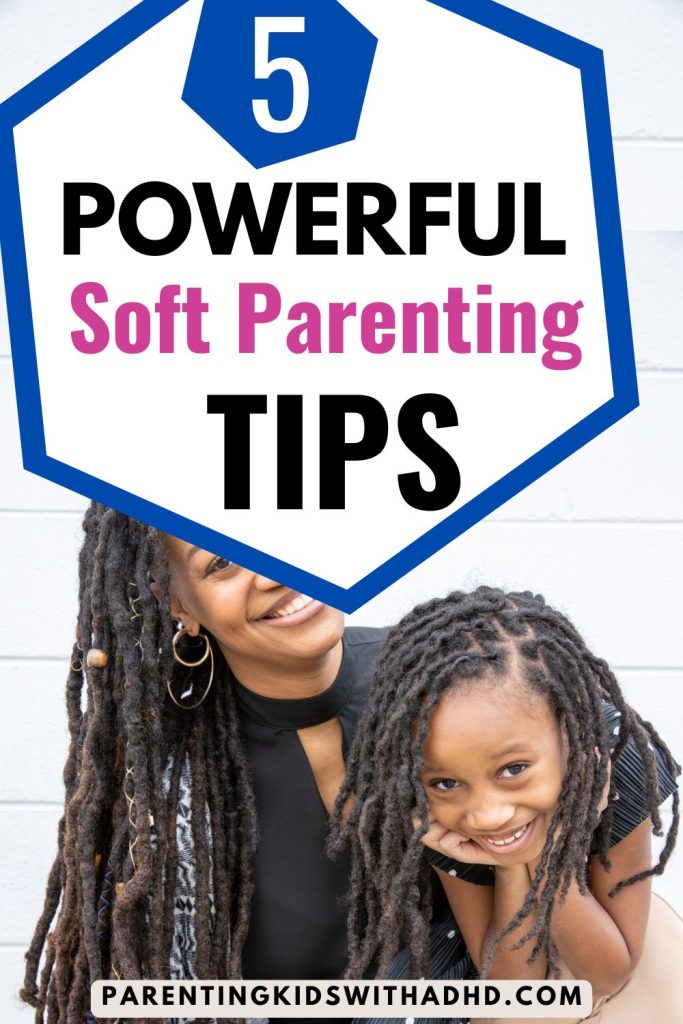5 Powerful ADHD Tips for Soft Parenting vs Hard Parenting

Introduction
Ever wondered if you’re being too soft or too hard on your child? I have. Especially as a Christian mom raising a neurodivergent child, the tension between soft parenting vs hard parenting has kept me up at night. What’s loving? What’s firm? What’s too much—or too little?
Or maybe you’ve questioned whether you’ve crossed the line into being too harsh? The struggle to find the “right” approach can feel overwhelming.
In this blog post, we’ll unpack these questions together. We’ll explore soft parenting vs hard parenting, the difference between gentle parenting vs authoritative parenting,and how grace fits into all of this—especially when parenting a child wired a bit differently.
You’ll discover the heart behind each style, what God’s Word says about correction and compassion, and how to find a healthy, grace-filled balance that nurtures your child and honors your calling as a mom.
What you’ll learn:
- What is soft parenting?
- Authoritative vs gentle parenting
- How to recognize when you’re leaning too far in either direction
- Biblical principles to help you parent with both love and limits
- Encouragement for weary hearts seeking to parent with grace
Expect encouragement, clarity, and practical tips that affirm both your calling and your child’s God-given uniqueness.
What Is Soft Parenting?
Soft parenting (also referred to as gentle or permissive parenting) is rooted in emotional connection, understanding, and support. It’s about honoring the child’s voice and experience. But here’s the thing: soft parenting doesn’t mean passive parenting.
Soft parenting meaning = relationship over rules, not rules removed altogether.
In fact, soft parenting can be incredibly hard work—especially when parenting ADHD children who test boundaries frequently and struggle with impulse control.
It requires deep patience, constant emotional regulation (on our part), and daily dependence on God’s grace.
I’ve learned that soft parenting isn’t about letting my son “get away with it.” It’s about guiding him through it—with compassion and consistency. That balance is key.
Am I Too Soft as a Parent?
I remember one night, sitting on the edge of my bed after yet another meltdown—not from my child, but from me. I had gone the whole day trying to stay calm, gentle, understanding… but by bedtime, I was drained.
And then that thought hit me like a ton of bricks: “Maybe I’m just too soft.”
If you’ve ever asked yourself that question, you’re not alone. Soft parenting, especially in Christian and ADHD parenting circles, can be misunderstood. People might assume it means letting your child get away with everything.
You may also hear well-meant advice that says, “you’re too soft, all your child needs is more discipline.” But the thing is, they’re not you, they’re not your child, and most likely they don’t understand ADHD.
In reality, soft parenting—when done with intention—springs from a place of deep empathy and connection. It’s about prioritizing relationship over control. That’s not weakness. That’s wisdom.
With our ADHD kiddos, connection is vital. Yes, they need to be corrected. But connection first. Correction second. They can’t help it (in most instances) when they ‘misbehave.’
Yet, if you’re constantly second-guessing whether you’re enabling bad behavior or just being gracious, it’s time to dig a little deeper.

PIN ME FOR LATER!
What Is Considered Harsh Parenting?
Harsh parenting can sometimes wear a mask of “firmness” or “discipline,” especially in Christian communities where obedience is emphasized. But it often goes beyond correction and leans into fear-based tactics—yelling, threatening, constant criticism, or even emotional withdrawal.
For ADHD kids, harsh parenting doesn’t just sting—it wounds.
These children are already receiving frequent correction from the world around them. When home becomes another battlefield, they internalize the idea that they’re “bad,” not just behaving badly.
And as moms, when we slip into this pattern, we end up battling guilt afterward. We say things like, “I yelled again. I’m a terrible mom.” “I’m feeling like a bad mom.”
I’ve been there. I’ve said those exact words. And the shame that follows can feel unbearable.
Harshness might bring temporary obedience, but it rarely nurtures lasting change.
What Does Harsh Parenting Look Like?
Harsh parenting often includes:
- Harsh punishments rather than natural consequences
- Shaming language (“What’s wrong with you?”)
- Emotional coldness or distance
- Over-correcting without connecting
I once had a season where I corrected my son constantly—every minute felt like a correction moment. And then one day, he said, “Mommy, do I always do something wrong?” It broke me.
That’s when I realized my harshness wasn’t helping. It was hurting.
Especially for ADHD kids, who often feel misunderstood, harshness can shut down their hearts. What they need most is a safe home base where they can regroup after the world tells them they’re “too much.”
Gentle Parenting vs Authoritative Parenting
Now, this is where things get interesting. Many Christian moms wonder: is gentle parenting too lenient? Is authoritative parenting better?
Here’s a helpful comparison:
- Gentle parenting leans on empathy, connection, and emotional validation.
- Authoritative parenting balances warmth and limits. It includes boundaries, but also a listening ear and a soft heart.
So, is authoritative parenting good? Yes—but only when it flows from a heart of grace. Is authoritative parenting the best? For many ADHD families, it might be, when paired with gentle connection.
It is then that it becomes grace-based parenting.
The trick is not to label your parenting but to tune into what your child needs in each season—and how the Holy Spirit is guiding you.
Finding Your Parenting Balance
There were times I thought I needed to be more firm, especially when my ADHD son wouldn’t listen. And other times, I felt like I was walking on eggshells trying to keep peace.
The truth is, I needed a reset—a grace-based perspective.
Here’s what I’ve discovered:
- It’s okay to be soft and strong.
- It’s okay to discipline without yelling.
- It’s okay to say “no” with kindness.
- It’s okay to give second chances—just like God gives us.
Your parenting doesn’t have to fit into a label. It just needs to be rooted in love, guided by truth, and covered in grace.
Your parenting style will also adapt over the years, not just because you become wiser (LOL) and more experienced, but also because ADHD shows differently depending on the age your child is.
Wish you had someone who gets it? Someone who understands the meltdowns, the misjudgments, the mom-guilt?
That’s why I became a parenting coach for moms of ADHD kids. Let’s connect and create a new way forward—with grace, strength, and Jesus at the center.

5 Tips for Navigating Soft and Hard Parenting
As Christian moms raising kids with ADHD, many of us wrestle daily with whether we’re being too soft or too hard. We wonder, “Am I letting too much slide?” or “Was I too harsh just now?”
It’s easy to get stuck in the pendulum swing—grace one moment, guilt the next. But what if there’s a way to parent with both love and limits, gentleness and guidance? Parenting like Jesus would do?
These grace-filled tips are here to encourage you in those everyday moments where you’re unsure which tone, rule, or response is “right.” They’re not perfect solutions, but they are spirit-led reminders for those of us walking this sacred, messy path of ADHD parenting.
1. Pray before you parent
Before you walk into a correction moment—or even the kitchen in the morning—pause and pray. Even if it’s messy or whispered: “Jesus, help me parent with Your love today.”
Parenting ADHD kids can be unpredictable and exhausting, but prayer grounds us in God’s presence. It’s not about asking for perfect behavior from our kids, but for peace, patience, and perspective.
When we pray for our ADHD kids first, we shift from reacting in fear or frustration to responding with faith. James 1:5 reminds us, “If any of you lacks wisdom, you should ask God… and it will be given to you” (James 1:5 NIV). That includes parenting wisdom, too.
2. Know your child’s wiring
God knit your child together with intention—even their ADHD brain. Psalm 139:14 says, “I praise you because I am fearfully and wonderfully made” (Psalm 139:14 NIV). That includes their quirks, intensity, energy, and sensitivity.
When we understand how their brain works, we parent with compassion instead of comparison. ADHD kids aren’t trying to be difficult—they’re often overwhelmed themselves.
Learning about executive function, sensory issues, and emotional regulation equips us to discipline with both kindness and clarity. What works for others might not work for you—and that’s okay.
3. Use firm boundaries with soft words
One of the most powerful things I’ve learned is that I can hold my boundaries without raising my voice. Saying, “I love you too much to let you speak to me like that,” teaches more than a yell ever could.
Jesus was both strong and gentle—He flipped tables, yes, but He also kneeled beside the broken. As Christian moms, we’re invited to model that same blend of truth and grace. Proverbs 15:1 says, “A gentle answer turns away wrath” (Proverbs 15:1 NLT).
Your softness doesn’t mean surrender—it means strength under God’s control.
4. Validate emotions before correcting behavior
ADHD kids often feel big emotions but don’t know what to do with them. If we jump straight to discipline, we miss their heart. Try saying, “You’re feeling really frustrated—I get it,” before offering direction.
This doesn’t excuse disobedience, but it opens the door to real connection. Jesus always saw people’s hearts before addressing their actions.
When we meet our kids in their struggle instead of trying to fix them right away, we mirror that same compassion. This builds trust and softens their spirit to receive correction.
5. Reflect on your own triggers
Sometimes we react harshly not because of what our child did, but because their behavior triggered something in us—our childhood wounds, our need for control, or our fear of being judged.
Parenting is often God’s invitation to healing.
Instead of spiraling into shame, invite Jesus into those places. Say, “Lord, show me what’s really going on inside me.” This isn’t just about parenting well—it’s about growing as a woman of faith. 2 Corinthians 12:9 says, “My grace is sufficient for you, for my power is made perfect in weakness” (2 Corinthians 12:9 ESV).
For me, this was an eye-opener! Once I realized my own emotions often were the reason for my reactions toward my child, I learned to keep calm and obejectively ‘judge’ the situation.
Your triggers aren’t a sign of failure—they’re an opportunity for grace.
Takeaway Soft Parenting vs Hard Parenting ADHD Kiddos
Soft parenting vs hard parenting isn’t a matter of weakness vs strength. It’s a matter of fear vs faith.
Mamas, you’re not failing if you’re feeling confused. You’re not too soft just because you lead with compassion. You’re not too harsh because you’ve had a hard moment. And most importantly—you’re not alone.
Parenting an ADHD child as a Christian mom requires wisdom, courage, and yes, plenty of do-overs. But praise God, we serve a Father who never tires of giving us fresh starts.
So if you’re wondering, what is soft parenting? Or is authoritative parenting good? Remember, parenting by grace means showing up imperfectly but consistently. Not with fear. But with faith.
If this post encouraged you, you might also like:
- 12 Powerful Tips When You’re Feeling Like a Bad Mom
- Parenting by Grace: Faith-Based Reset for Weary Moms
Disclaimer
Everything shared in this blog is based on my personal experience, ADHD parenting training, and as a certified, ICF-credentialed life coach. I am not a medical doctor, psychologist, or licensed therapist. The content is for informational and encouragement purposes only and should not be considered medical or mental health advice.
If you suspect your child may have ADHD or any other medical condition, please consult with a qualified healthcare provider, such as a clinical psychologist, pediatrician, or psychiatrist, for an official assessment and diagnosis.
I specialize in coaching Christian moms who are raising kids with ADHD—helping you parent with grace, confidence, and faith. If you’d like personalized support, feel free to reach out and learn more about how I can walk this journey with you.






